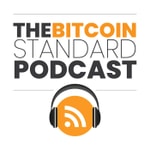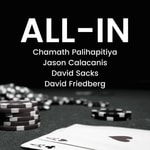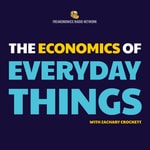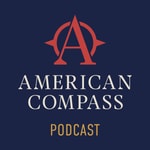The Answer Is Transaction Costs – Détails, épisodes et analyse
Détails du podcast
Informations techniques et générales issues du flux RSS du podcast.

The Answer Is Transaction Costs
Michael Munger
Fréquence : 1 épisode/14j. Total Éps: 57

"The real price of everything is the toil and trouble of acquiring it." -Adam Smith (WoN, Bk I, Chapter 5)
In which the Knower of Important Things shows how transaction costs explain literally everything. Plus TWEJ, and answers to letters.
If YOU have questions, submit them to our email at taitc.email@gmail.com
There are two kinds of episodes here:
1. For the most part, episodes June-August are weekly, short (<20 mins), and address a few topics.
2. Episodes September-May are longer (1 hour), and monthly, with an interview with a guest.
Finally, a quick note: This podcast is NOT for Stacy Hockett. He wanted you to know that.....
Classements récents
Dernières positions dans les classements Apple Podcasts et Spotify.
Apple Podcasts
🇩🇪 Allemagne - socialSciences
31/07/2025#94🇺🇸 États-Unis - socialSciences
31/07/2025#50🇺🇸 États-Unis - socialSciences
30/07/2025#38🇺🇸 États-Unis - socialSciences
29/07/2025#51🇺🇸 États-Unis - socialSciences
28/07/2025#45🇺🇸 États-Unis - socialSciences
27/07/2025#33🇬🇧 Grande Bretagne - socialSciences
26/07/2025#92🇺🇸 États-Unis - socialSciences
26/07/2025#33🇬🇧 Grande Bretagne - socialSciences
25/07/2025#70🇩🇪 Allemagne - socialSciences
25/07/2025#91
Spotify
Aucun classement récent disponible
Liens partagés entre épisodes et podcasts
Liens présents dans les descriptions d'épisodes et autres podcasts les utilisant également.
See allQualité et score du flux RSS
Évaluation technique de la qualité et de la structure du flux RSS.
See allScore global : 48%
Historique des publications
Répartition mensuelle des publications d'épisodes au fil des années.
From Law to Legislation: A Natural Process
Saison 2 · Épisode 12
lundi 30 septembre 2024 • Durée 54:31
Have you ever wondered how common law rules and market prices both "emerge"? Inspired by the works of James Buchanan, F.A. Hayek, and Bruno Leoni, Donald Boudreaux explains how decentralized processes can lead to the emergence of effective norms, such as queuing and speeding rules, without the need for top-down legislation. We discuss the significance of individuals spending their own money versus others' and how these incentives impact societal outcomes, highlighting the deep wisdom embedded in traditionally evolved rules.
We also venture into the nuanced distinction between law and legislation, drawing on insights from Buchanan and Hayek. We elaborate on Buchanan's concept of "relatively absolute absolutes," and on Hayek’s emergence process, emphasizing the continuous generation of information through human action and preferences. Discover the natural process behind the emergence of common law, its role in establishing predictable rules, and the challenges presented by the unpredictable nature of parliamentary law.
Guest: Donald Boudreaux at George Mason University
Some Links:
- Econtalk, Sept 30, 2024: “The Underrated Bruno Leoni”
- Econtalk, Dec 11, 2006: "Law and Legislation"
- Michael Munger and Georg Vanberg, 2023, Contractarianism, Constitutionalism, and the Status Quo. Public Choice.
- Michael Munger, 2023, “The Socialist Generation Debate,” AIER.
- Quotes from Bruno Leoni on Cafe Hayek (a search, as suggested by Don Boudreaux)
Book o’da’month: Bruno Leoni, FREEDOM AND THE LAW
If you have questions or comments, or want to suggest a future topic, email the show at taitc.email@gmail.com !
You can follow Mike Munger on Twitter at @mungowitz
Why Bosses Don't Wear Bunny Slippers: TAITC
mardi 27 août 2024 • Durée 23:09
Ever wondered why firms exist in a market-driven economy? This month's episode promises to unravel this question by diving deep into Ronald Coase's seminal 1937 paper, "The Nature of the Firm." Join me, Mike Munger, as I reflect on our first 16 months of podcasting and share the insights and wisdom that have shaped our journey. You'll gain a thorough understanding of how transaction costs influence economic behaviors and organizational structures, with fascinating examples from Richard Langlois' analysis of the American Midwest's agricultural sector before the railroad era.
- Ronald Harry Coase, The Nature of the Firm (1937)
- Michael Munger, Why Bosses Don't Wear Bunny Slippers
You can follow Mike Munger on Twitter at @mungowitz
Baseball, Dollar Dogs, Apple Pie and Transaction Costs
Saison 2 · Épisode 4
mardi 25 juin 2024 • Durée 16:30
Why would a baseball stadium limit the number of $1 hot dogs per customer on Dollar Hot Dog Night? Find out as we work on this intriguing question posed by a curious high school student named HJ. Through the lens of transaction costs, we reveal how these promotional events are less about selling hot dogs and more about enhancing the overall (cheap!) game experience to attract new fans. Using a real-life example from a recent Mets game, we explore how such promotions can change the crowd dynamics, boost attendance, and ensure a positive atmosphere for everyone, even when things get a bit rowdy.
And the TWEJ: A dad joke, because of course it is
Three apple pie prices (for one pie!)
Samuel Bagg's book The Dispersion of Power (Oxford)
If you have questions or comments, or want to suggest a future topic, email the show at taitc.email@gmail.com !
You can follow Mike Munger on Twitter at @mungowitz
Dam Shame: It's not easy being government
Saison 2 · Épisode 3
mardi 18 juin 2024 • Durée 24:11
I have been interested lately in a paper Bill Keech and I were working on a decade ago,
It was called "The Anatomy of Government Failure."
Was AC Pigou the first "Public Choice" theorist?
There are two transaction costs problems in the background:
1. Information asymmetries and the problem of ignorance
2. Incentive problems and institutional design
Market failure is actually a thing. And it can be complicated: Kleinman and Teles, "Market and Non-Market Failures."
But so is government failure. There is no reason to expect government action to be Pareto Optimal.
The problem is that every flaw in consumers is worse in voters!
It could even be argued (I did!) that a "good" industrial policy is impossible in a democracy.
Book o'da week: The Next American Economy: Nation, State, and Markets in an Uncertain World . 2022, Encounter Books. by Samuel Gregg.
You can follow Mike Munger on Twitter at @mungowitz
Corner Crossing Conundrum: Trespassing, Airspace, and Property Rights
Saison 2 · Épisode 2
mardi 11 juin 2024 • Durée 23:18
What if crossing a mere corner of private land could land you in legal hot water? This episode tackles the thorny issue of corner crossing, where public and private lands meet at a single point, creating potential trespassing conflicts. We'll dissect Dave Schmitz's insights on the limits of property rights and the Roman law doctrine of ad coelum, which extends property rights from the heavens to the earth's core. Through landmark cases like Hinman v. Pacific Air Transport and Jacques v. Steenberg Homes, you'll gain a deeper understanding of how airspace and land use rights have evolved.
Links:
- Corner-crossing https://www.casebriefs.com/blog/law/property/property-law-keyed-to-singer/trespass-and-public-rights-of-access-to-property/jacque-v-steenberg-homes-inc/
- Corner-crossing update https://wyofile.com/ranch-owner-corner-crossing-would-erase-billions-in-private-property-value/
- More on corner-crossing https://oilcity.news/crime/court/2024/05/14/who-are-the-judges-hearing-tuesdays-corner-crossing-appeal/#:~:text=The%20panel%20for%20the%2010th,property%20in%202020%20and%202021.
- Hinman v. Pacific Air Transport https://casetext.com/case/hinman-v-pacific-air-transport
- Jacques v. Steenberg Homes: https://www.wicourts.gov/sc/opinion/DisplayDocument.html?content=html&seqNo=17010
Book: Jeffrey Rosen, The Pursuit of Happiness: How Classical Writers on Virtue Inspired the Lives of the Founders and Defined America. Simon Schuster.
https://www.simonandschuster.com/books/The-Pursuit-of-Happiness/Jeffrey-Rosen/9781668002476
If you have questions or comments, or want to suggest a future topic, email the show at taitc.email@gmail.com !
You can follow Mike Munger on Twitter at @mungowitz
The Riddle is Transaction Costs: That's What the Money is For!
Saison 2 · Épisode 1
mardi 4 juin 2024 • Durée 17:15
Can a single $100 bill solve an entire town's debt crisis? This riddle is a window into transaction costs. I rely on Jeffrey Rogers Hummel's insights, adding a few thoughts of my own.
And a cool letter: Ever wondered why you haggle for a car but not for your morning Starbucks's coffee?
Plus, a book recommendation: Nobel Prize-winning economist Edmund Phelps' "My Journeys in Economic Theory," a compelling read that blends economic insights with political theory.
Links:
- David Henderson gives a statement of "the riddle"
- J.R. Hummel's web site
- Similar story, from LvMI
Haggling:
Sebastian Schweighofer-Kodritsch, "The Bargaining Trap," Games and Economic Behavior, November 2022, v. 136, pp. 249-54.
Book recommendation:
- Edmund Phelps, My Journeys in Economic Theory. Columbia University Press. https://cup.columbia.edu/book/my-journeys-in-economic-theory/9780231207300
You can follow Mike Munger on Twitter at @mungowitz
From Commons to Coase and Beyond, With Steven Medema
Saison 1 · Épisode 27
mardi 28 mai 2024 • Durée 01:02:24
What if understanding the hidden costs in every transaction could revolutionize how we see economics? Stephen Medema of Duke University opens up about his academic pivot from computational tax policy to the history of economic thought, weaving in tales of detective-like intrigue and the thrill of uncovering the makers and movers behind economic theories.
Beginning with John R. Commons' critical insights, and moving through Ronald Coase's focus on transaction costs as the critical difference among institutions, we explore how these issues shape our understanding of efficiency and the "If markets are so great, why are there firms?" Don't miss four new economics jokes (one is lawyer joke, in honor of common law!), my book recommendations, and get psyched for a summertime return to shorter, more frequent episodes.
Meaning of "Kaleidic": From Roger Garrison https://webhome.auburn.edu/~garriro/r8lachmann.htm
Letters:
Corner Crossing:
- https://www.nytimes.com/2022/11/26/business/hunting-wyoming-elk-mountain-access.html?searchResultPosition=1
- https://www.wyomingpublicmedia.org/natural-resources-energy/2024-05-13/corner-crossing-case-back-in-court
Books:
•Glenn Loury, Late Admissions: Confessions of a Black Conservative. https://wwnorton.com/books/9780393881349
(Econtalk Podcast on the Loury book: https://www.econtalk.org/glenn-loury-tells-all/ )
•Kevin Munger, The Youtube Apparatus, from Cambridge Essentials. https://www.cambridge.org/core/elements/youtube-apparatus/36600D69788530F805C650B70976A585
You can follow Mike Munger on Twitter at @mungowitz
Desert Town Dilemmas and the Problem of Property Rights
Saison 1 · Épisode 26
mardi 30 avril 2024 • Durée 01:01:55
We embark on a journey through the lenses of Hume, Smith, and Coase, piecing together the roles of observation and empirical study in shaping our understanding of societal conventions and moral philosophy. David Schmidtz recounts a defining moment from his academic path, sparking a robust discussion on the fusion of economics with moral considerations in the realm of ownership and resource distribution.
The discussion with David delves into the essence of property ownership, dissecting what it means to hold rights over something as abstract as an idea or as concrete as land. We grapple with the notion that property is not just a "bundle of sticks" but a set of societal constructs, born from necessity and shaped by our collective desire for harmony. Through examples of conflict resolution and the negotiation of public and private interests, such as eminent domain and navigation easements, we confront the delicate dance between individual autonomy and the greater good. The philosophical undercurrents of property law are laid bare, revealing the presumption in favor of liberty in those deep waters.
The "Desert Town" source: https://www.cambridge.org/core/books/abs/elements-of-justice/desert/268B6C7A9B17949572933A4DAA0CAB09
Wall Street Journal article on Costco gold purchases: https://www.wsj.com/finance/investing/selling-costco-gold-bars-f14e966f
Biden DOT rule on airline refunds:
- https://www.transportation.gov/briefing-room/biden-harris-administration-announces-final-rule-requiring-automatic-refunds-airline
- https://abcnews.go.com/Politics/airlines-give-automatic-refunds-canceled-flights-delayed-3/story?id=109573733
Lynne Kiesling on The Essential Ronald Coase, Fraser Institute.
Books:
C. Johnson, R. Lusch, Schmidtz, Commercial Society: A Primer on Ethics & Economics (Rowman & Littlefield).
Bryan Caplan and Ady Branzei. Build, Baby, Build. Graphic novel just published by the Cato Institute
You can follow Mike Munger on Twitter at @mungowitz
Caldwell: Hayek's Intellectual Journey
Saison 1 · Épisode 24
mardi 26 mars 2024 • Durée 01:08:32
Come along on a journey through the corridors of economic history and methodology with our esteemed guest, Bruce Caldwell from the Center for History of Political Economy at Duke University. Caldwell's personal voyage, from the nuances of economic methodology to his deep dive into Austrian economics, sets the stage for an enthralling discussion on the workings of institutions, transaction costs, and the profound impact of Friedrich Hayek's theories on modern economics. Get ready to unlock the secret meaning behind the unique TIPS acronym within Austrian economics.
We follow Hayek's intellectual transition from his focus on business cycles to the intricate challenges of economic calculation and knowledge distribution. The conversation illuminates the value of information in economic decision-making and highlights the importance of markets in reconciling diverse plans and purposes. Discover how Hayek's 1945 paper reshaped economic thinking, extending its influence beyond the Austrian school and into the realms of neoclassical economics.
Our exploration culminates with an examination of the very fabric holding our economic systems together – institutions. Delve into the evolution of economic institutions with insights from Doug North's intellectual quest and the relevance of Austrian capital theories in understanding economic flexibility.
Links:
Bruce Caldwell, Beyond Positivism https://www.amazon.com/Beyond-Positivism-Bruce-Caldwell/dp/1138834238
Bruce Caldwell and Hansjoerg Klausinger, Hayek: A Life, 1899-1950 https://www.amazon.com/Hayek-Life-1899-1950-Bruce-Caldwell/dp/0226816826/
F.A. Hayek, 1945: The Use of Knowledge in Society, American Economic Review. https://www.econlib.org/library/Essays/hykKnw.html
Michael Munger, "The Socialist Generation Debate" https://www.aier.org/article/the-socialist-generation-debate/
Surge Pricing, NPR. https://www.vox.com/money/24105250/fast-food-restaurants-dynamic-pricing-algorithm-wendys
Hope Center at Duke. https://today.duke.edu/2018/08/duke-center-expands-commitment-history-economics
You can follow Mike Munger on Twitter at @mungowitz
Making Deals With Shadows: The Economics of Ransomware and Cybersecurity
mardi 27 février 2024 • Durée 44:53
The digital realm is rife with invisible threats, and this episode doesn't shy away from the gritty realities of ransomware and the burgeoning industry of cyber insurance. We tackle the conundrum: How do these defensive expenditures impact our economy when they don't actually produce anything tangible? From the early days of cyber insurance to the ongoing battle against hackers, learn how organizations across the board—from the halls of government to the frontlines of business—are fortifying their defenses against a barrage of cyber threats, each with their own unique strategies and vulnerabilities.
Wrapping up with a human touch, our conversation turns to the pivotal role individuals play in the security of networks and the negotiation tactics employed once defenses have been breached. And because all work and no play makes for a dull podcast, we round off the session with a sprinkling of economic humor, answering listener queries with a blend of wit and wisdom. Don't forget, for those hungry for more knowledge, I've got some book recommendations to deepen your understanding of the legendary thinker Adam Smith.
Links:
Anja Shortland Website: https://www.kcl.ac.uk/people/anja-shortland-1
Duke CHOPE Hayek Lecture with Dr. Shortland: https://www.youtube.com/watch?v=Czs2EYDo2sI
Books:
Arthur Herman: How the Scots Invented the Modern World https://www.amazon.com/How-Scots-Invented-Modern-World/dp/0609809997
James Otteson: Adam Smith's Marketplace of Life https://www.amazon.com/Adam-Smiths-Marketplace-James-Otteson/dp/0521016568/ref=monarch_sidesheet
Adam Smith: The Theory of Moral Sentiments https://www.libertyfund.org/books/the-theory-of-moral-sentiments/
EconTalk Book Club (six episodes): https://www.econtalk.org/klein-on-the-theory-of-moral-sentiments-episode-1-an-overview/
You can follow Mike Munger on Twitter at @mungowitz









